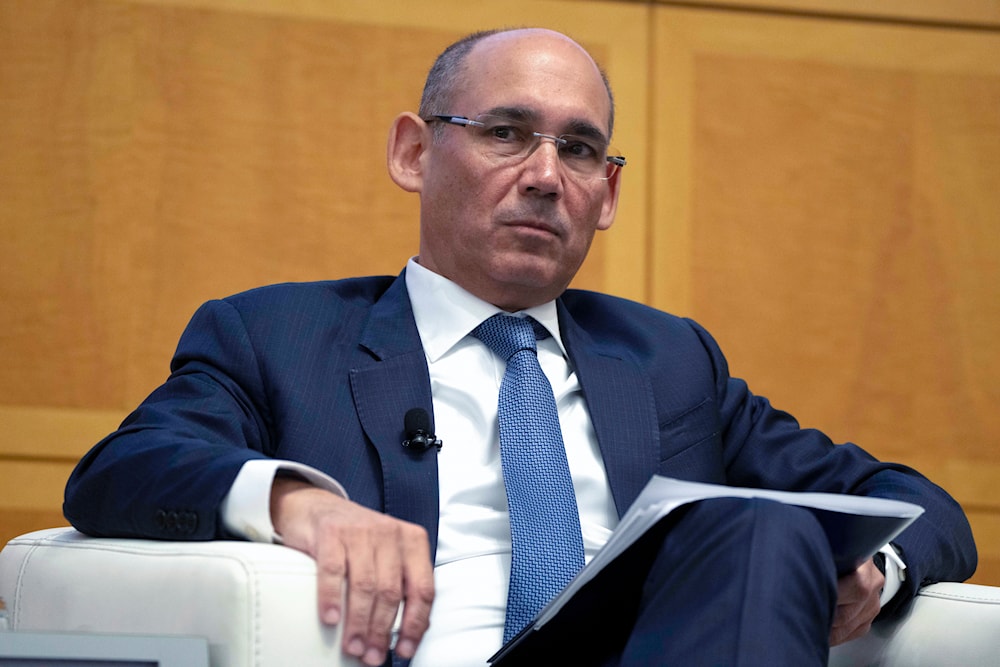Israeli Central Bank chief challenges Netanyahu's budget
The Israeli Central Bank governor emphasized that the Israeli economy has yet to return to its pre-war state, noting that the wars will have long-term consequences.
-
 Amir Yaron, Governor of the Bank of Israel, is introduced at the 24th Jacques Polak Research Conference at the International Monetary Fund in Washington, United States, Thursday, Nov. 9, 2023 (AP)
Amir Yaron, Governor of the Bank of Israel, is introduced at the 24th Jacques Polak Research Conference at the International Monetary Fund in Washington, United States, Thursday, Nov. 9, 2023 (AP)
The Israeli Central Bank governor, Amir Yaron, publicly criticized Prime Minister Benjamin Netanyahu's government budget in a report published on Wednesday, suggesting that it will fail to bring down the national debt, which has increased sharply after 18 months of war.
The spending plan, which was approved by the Knesset on Tuesday, takes "significant convergence measures this year, mainly on the revenue side," according to the Central Bank governor. He added that these convergences “will roughly offset the increase in fixed expenditures deriving from the war.”
However, Yaron explained, these measures are "not enough to ensure a sustained decline” in the debt-GDP ratio due to the temporary nature of the measures and the anticipated increases in government spending.
Yaron noted that the budget could have been better structured, focusing more on investments in long-term growth drivers, boosting productivity, enhancing the education system, and minimizing disincentives to workforce participation.
"Israel’s" economy saw relief with a Lebanon ceasefire in November and one in Gaza in mid-January, but the recent breakdown of the latter and the Israeli military's renewed aggression on Gaza have pressured Israeli assets, with the shekel down 2.8% against the dollar in the past month, making it the world’s second-worst performer after the Turkish lira.
The 620 billion shekel ($169 billion) budget, setting a deficit target of 4.9% of GDP compared to last year’s 6.8%, includes a 35 billion shekel fiscal adjustment package with new taxes and some spending cuts.
“The long-term consequences of the war are not limited to fiscal measures,” the governor stated, emphasizing that “they may also be reflected over time in the economy’s risk premium and credit rating.”
Israeli economy stalls: 0.7% growth, 3.6% inflation
Last month, The Jerusalem Post reported on February 11 that "Israel's" economy continued to struggle in the second half of 2024, as its war on Gaza deepened financial instability and eroded investor confidence. According to the Bank of Israel's latest financial stability report, macroeconomic risks remain high despite minor improvements in credit and asset pricing.
The central bank's risk assessment, which evaluates the exposure of "Israel's" financial system to macroeconomic challenges, found that economic instability persisted due to the security situation. The report pointed to the war's impact on global perceptions of "Israel's" economy, affecting businesses, government finances, and borrowing costs.
The observations align with projections from the International Monetary Fund (IMF), which recently revised "Israel's" 2024 GDP growth forecast down to 0.7%, citing regional conflicts and heightened uncertainty as major concerns.
Despite a somewhat modest GDP growth following a contraction at the end of 2023, "Israel's" economy has yet to regain its expected trajectory.
"The Composite State of the Economy Index, which indicates the level of economic activity, continued to be sluggish in October and November," the Bank of Israel stated, noting that economic conditions remain difficult.
Meanwhile, the Organisation for Economic Co-operation and Development (OECD) predicts that "Israel's" GDP will grow by 2.4% in 2025 and 4.6% in 2026, largely driven by increased military expenditure and government demand.
The government's increased fundraising efforts and higher bond yields reflected investor concerns. Additionally, Moody's recently downgraded "Israel's" credit rating from A2 to Baa1, warning that the prolonged war could continue to strain the economy.

 4 Min Read
4 Min Read








